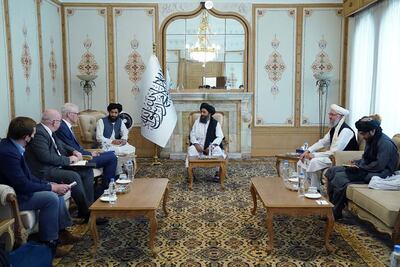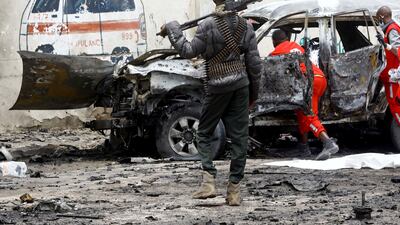Britain retains relevance as a strategic partner for African and Indo-Pacific countries that will now come under greater threat of extremist violence from terrorist groups emboldened by the Taliban’s rise to power in Afghanistan, the UK defence secretary has warned.
Ben Wallace said the UK military's capability to conduct counter-terrorism operations far beyond its borders following its significant investment in drones would be called on in future.
During a high-powered Policy Exchange think tank debate, Mr Wallace was backed by former Australian foreign minister Alexander Downer, who suggested that Britain was “back as a major power” on the world stage.
The immediate result of the Taliban victory in Afghanistan was a raised terrorist threat, said Mr Wallace, a former soldier. “The ripples from Afghanistan will be felt by Al Shabab in Somalia and of course Al Shabab pose a threat to British interests in Kenya and our friends in Kenya. The ripples of another superpower being portrayed as defeated by Islamic terrorism will be felt across the world.”
Following heavy reliance on Uzbekistan and Pakistan during the August evacuation of Afghanistan, he admitted that Britain had neglected forming closer ties with “others we haven't always in the past paid a great deal of attention to”.
Afghanistan also demonstrated that “some of our international relations are not as good and we need to invest in those,” he told the Conservative Party conference fringe event. “I think for many decades people have taken for granted the comfort they live in.”
With growing “Great Power” rivalry, particularly with China’s ascendancy, it is now more important than ever for the West to unite “because alliances matter”, he said.
“What do our adversaries not have? What do China and Russia not have? Friends.” Then in reference to the Kremlin’s alliances with the Belarus regime, Mr Wallace said: “If you define your friend as Belarus then you are in a pretty lonely place.”

Two UK diplomats travelled to Afghanistan on Monday to hold direct talks with the Taliban, including on preventing a resurgent terror threat from the country.
The two diplomats were Sir Simon Gass, a special envoy for Afghanistan, and Martin Longden, the UK's top emissary to the Taliban's Doha office.
As well as the terror threat, they discussed the treatment of women and girls and safe passage for people seeking to flee Afghanistan, the UK government said.
It marks the first time the UK has sent officials to the country to hold talks with the Taliban leaders since the mass evacuation of Kabul in August.
Mr Wallace suggested that following the Taliban's power grab in Afghanistan the West would be confronted by emboldened foes.
“We have values that matter and it's definitely time that we stand up for those values, because the one thing that we are going to be tested on is our resolve.”
The problem in Afghanistan will “live with us for a long time” but Britain would be robust in dealing with terrorism, he said, referring to drone strikes.

“We have capabilities now that can allow us to reach from outside-in to take whatever action we have to in accordance with international law to protect ourselves. It's never as good as being on the ground alongside partners, but we have those capabilities and we will use them as necessary.”
He was joined by Mr Downer, a long-serving Australian foreign minister, who argued that the new Aukus agreement between his country, the UK and US meant that Britain was reconnecting with the world.
“The UK is a leading country with fundamental liberal democratic values and this world would be a more stable place if those values prevail,” he said. “The signs are there that the UK is back as a major player, and the UK is making a contribution … and it's been very exciting to see this transformation of British foreign and security policy.”
Alicia Kearns, an MP on the UK Parliament's Foreign Affairs Committee, argued that a key lesson from the Afghanistan debacle was the need for Western resilience.
“We cannot run away from enduring conflicts, from forever wars we don't want,” she said. “Remaining strong and steadfast behind our allies is a sign of confidence and guts. It is not a weakness, it is not a failure, it's a recognition that stability takes time and you have to build from the ground up.”
Former Canadian prime minister Stephen Harper said that America’s decision to withdraw from Afghanistan was a “return to isolationism”.
“It's the United States moving away from what has been considered its global leadership role and this, in my judgment, is as true under Joe Biden as it was under Donald Trump,” Mr Harper told the event, titled The UK’s Integrated Review in the Wake of Afghanistan.


